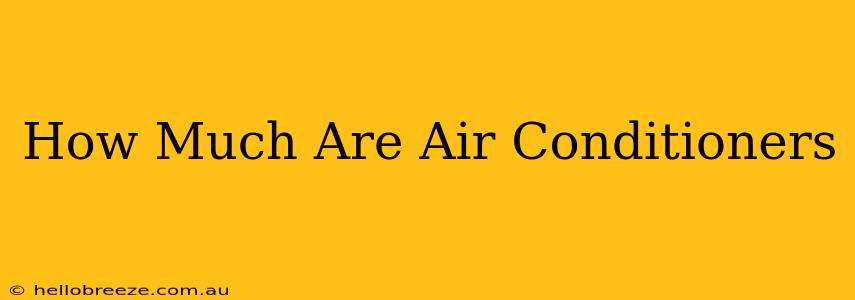Shopping for an air conditioner can feel overwhelming. With so many brands, types, and features available, figuring out the cost is just the first step. This guide breaks down the price ranges for different air conditioner types, influencing factors, and tips to help you find the perfect unit at the right price.
Understanding Air Conditioner Costs: A Breakdown
The price of an air conditioner varies dramatically depending on several key factors. Let's explore the major ones:
1. Type of Air Conditioner:
This is perhaps the biggest factor influencing cost. Here's a general overview:
-
Window Air Conditioners: These are the most budget-friendly option, typically ranging from $100 to $500. Smaller units fall on the lower end, while larger, higher-BTU models can reach the upper limit.
-
Portable Air Conditioners: Offering flexibility, these units generally cost more than window units, typically ranging from $300 to $800. Their price increases with features like improved cooling capacity and advanced technology.
-
Split Air Conditioners (Mini-Splits): These systems offer superior cooling and energy efficiency, but come with a higher price tag. Expect to pay anywhere from $1000 to $4000+ depending on the size, features, and installation costs. This price often includes professional installation, which is crucial for optimal performance.
-
Central Air Conditioners: These are the most expensive option, usually installed as part of a whole-house HVAC system. Costs can range from $5,000 to $15,000+, depending on the size of your home and ductwork requirements. Professional installation is essential and significantly contributes to the overall cost.
2. BTU Rating (British Thermal Units):
BTU rating indicates the cooling capacity of an air conditioner. Higher BTU ratings mean more powerful cooling, which generally translates to a higher price. You'll need to determine the correct BTU rating based on the size of the room or space you want to cool.
3. Features and Energy Efficiency:
Advanced features like smart home integration, programmable timers, multiple fan speeds, and improved energy efficiency (SEER rating) all contribute to the overall cost. Energy-efficient models, while often more expensive upfront, can save you money on electricity bills in the long run. Look for high SEER ratings for better energy savings.
4. Brand Reputation:
Established brands often command higher prices than lesser-known brands. While a higher price doesn't always guarantee superior quality, reputable brands usually offer better warranties and customer support.
5. Installation Costs:
For split systems and central air conditioners, installation costs are a significant portion of the total expense. This includes labor, materials, and any necessary ductwork modifications. Always factor installation into your budget.
Finding the Best Deal on an Air Conditioner
- Shop around: Compare prices from different retailers, both online and in-store.
- Read reviews: Check online reviews to gauge the performance and reliability of different models and brands.
- Consider energy efficiency: Investing in an energy-efficient model can save money on your electricity bill over the lifetime of the unit.
- Factor in installation costs: Get multiple quotes from qualified installers for split systems and central AC units.
- Look for sales and rebates: Many retailers offer seasonal discounts and rebates on air conditioners. Check with utility companies for potential energy efficiency rebates.
Conclusion:
The cost of an air conditioner depends on your specific needs and preferences. By understanding the factors outlined above, you can make an informed decision and find the best air conditioner for your budget and cooling requirements. Remember to consider the long-term costs, including energy consumption and maintenance, when making your purchase.

